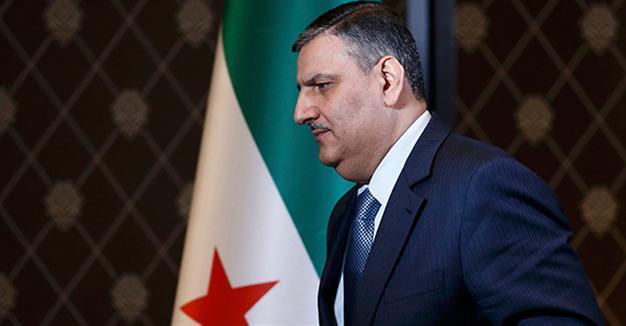Syria opposition chiefs leave Geneva talks after market strikes
GENEVA - Agence France-Presse

Riad Hijab, chief coordinator High Negotiations Committee (HNC) leaves after a news conference aside of Syria peace talks in Geneva, Switzerland, April 19, 2016 - REUTERS photo
Syrian opposition leaders started leaving Geneva after air strikes on markets in the northwest killed at least 44 people, saying they could not take part in peace talks while civilians were dying daily.
In some of the deadliest violence since a ceasefire took effect in February, a suspected regime bombing raid on April 19 hit a market in the city of Maaret al-Numan, killing at least 37 civilians, a monitor said.
Footage showed bloodied bodies scattered among twisted metal stalls in a street strewn with fruit and vegetables.
Another strike on a fish market in the nearby town of Kafranbel killed seven civilians, said the Syrian Observatory for Human Rights, a Britain-based monitoring group.
The strikes were in Idlib province, which is under the control of Al-Qaeda's Syrian offshoot Al-Nusra Front.
Like the Islamic State of Iraq and the Levant (ISIL) group, Al-Nusra is excluded from the ceasefire and regime forces have continued offensives in areas under its control.
The main opposition High Negotiations Committee condemned the strike on Maaret al-Numan as a "massacre" and clear violation of the truce.
"It is a dangerous escalation of an already fragile situation, showing contempt for the whole international community at a time when there is supposed to be a cessation of hostilities," said spokesman Salem al-Meslet.
The raid was "Assad's response" to the HNC's decision to suspend its formal participation in negotiations.
"Our decision to postpone our participation in the Geneva talks was taken to highlight the cynicism of the regime in pretending to negotiate while escalating the violence... The world must not ignore this challenge," said Meslet.
The troubled talks -- the latest in a long series of efforts to end Syria's five-year conflict -- failed to get off the ground this week despite hopes brought on by the ceasefire.
The partial truce, brokered by the United States and Russia, led to a dramatic drop in violence across Syria but a recent surge in fighting, especially around second city Aleppo, has raised fears of its total collapse.
The opposition announced on April 18 it was putting its participation on hold to protest escalating violence and restrictions on humanitarian access.
HNC coordinator Riyad Hijab said on April 19 that he and other delegates were beginning to leave Geneva.
"I will be travelling today along with some of my colleagues from the HNC. Some people left yesterday and today and they will keep leaving gradually until Friday," he said.
"It is not suitable, neither morally nor on the humanitarian side, to be part of negotiations when Syrians are dying daily from sieges, hunger, bombings, poisonous gases and barrel bombs."
The UN has insisted the talks have not collapsed, with its envoy Staffan de Mistura saying they would continue through the week.
Russian Foreign Minister Sergei Lavrov also insisted the talks were "not frozen" while US State Department spokesman John Kirby said "we continue to believe in the political process, in the importance of these talks".
This week's negotiations were meant to focus on Syria's political future, as the UN pushes a plan involving a transitional authority, a new constitution and eventual elections.
But Assad's fate has been the key sticking point, with the opposition insisting he must go and the regime refusing.
Speaking in Moscow, Lavrov said: "No one can win the war. All experts recognise this.
"There are some external players who dream about deposing the regime by force and try to do everything including disrupting the talks in Geneva."
The regime's lead negotiator reiterated on Apri 19 that Assad's fate remained off-limits but said Damascus was prepared to discuss the creation of a new unity government.
"A broader unity government is the only topic of discussion here," said Bashar al-Jafaari, Syria's ambassador to the UN.
World powers have backed the ceasefire and talks as the best hope yet to end a conflict that has devastated Syria, killed more than 270,000 people and forced millions from their homes.
But the rising violence in recent weeks has lowered expectations of a breakthrough.
Hijab called for international observers to be sent in and for ceasefire violators to be held to account.
He warned against wasting time, saying: "For Syrians the price of time is blood."
Danish lawmakers, meanwhile, approved a plan to commit F-16 warplanes and 400 military personnel, including special forces, to expand the country's fight against ISIL from "mid-2016".
Prime Minister Lars Lokke Rasmussen said the jihadist group "should meet a powerful response from the outside world".
